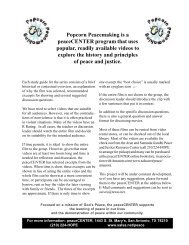LEO TOLSTOY Eleven Stories
LEO TOLSTOY Eleven Stories
LEO TOLSTOY Eleven Stories
You also want an ePaper? Increase the reach of your titles
YUMPU automatically turns print PDFs into web optimized ePapers that Google loves.
NEAR the borders of France and Italy, on the<br />
shore of the Mediterranean Sea, lies a tiny little kingdom<br />
called Monaco. Many a small country town can boast<br />
more inhabitants than this kingdom, for there are only<br />
about seven thousand of them all told, and if all the<br />
land in the kingdom were divided there would not be an<br />
acre for each inhabitant. But in this toy kingdom there<br />
is a real kinglet; and he has a palace, and courtiers, and<br />
ministers, and a bishop, and generals, and an army.<br />
It is not a large army, only sixty men in all, but<br />
still it is an army. There were also taxes in this kingdom<br />
as elsewhere: a tax on tobacco, and on wine and spirits<br />
and a poll-tax. But though the people there drink and<br />
smoke as people do in other countries, there are so few<br />
of them that the King would have been hard put to it<br />
to feed his courtiers and officials and to keep himself, if<br />
he had not found a new and special source of revenue.<br />
This special revenue comes from a gaming house,<br />
where people play roulette. People play, and whether<br />
they win or lose the keeper always gets a percentage on<br />
the turnover; and out of his profits he pays a large sum<br />
to the King. The reason he pays so much is that it is the<br />
only such gambling establishment left in Europe. Some<br />
of the little German Sovereigns used to keep gaming<br />
houses of the same kind, but some years ago they were<br />
forbidden to do so. The reason they were stopped was<br />
because these gaming houses did so much harm. A<br />
man would come and try his luck, then he would risk<br />
all he had and lose it, then he would even risk money<br />
that did not belong to him and lose that too, and then,<br />
in despair, he would drown or shoot himself. So the<br />
Germans forbade their rulers to make money in this<br />
way; but there was no one to stop the King of Monaco,<br />
and he remained with a monopoly of the business.<br />
So now every one who wants to gamble goes to<br />
Monaco. Whether they win or lose, the King gains by it.<br />
‘You can’t earn stone palaces by honest labour,’ as the<br />
proverb says; and the Kinglet of Monaco knows it is a<br />
dirty business, but what is he to do? He has to live; and<br />
to draw a revenue from drink and from tobacco is also<br />
not a nice thing. So he lives and reigns, and rakes in the<br />
money, and holds his court with all the ceremony of a<br />
real king.<br />
TOO DEAR!<br />
by Leo Tolstoy<br />
He has his coronation, his levees; he rewards, sentences,<br />
and pardons, and he also has his reviews, councils, laws,<br />
and courts of justice: just like other kings, only all on a<br />
smaller scale.<br />
Now it happened a few years ago that a murder<br />
was committed in this toy King’s domains. The people<br />
of that kingdom are peaceable, and such a thing had<br />
not happened before. The judges assembled with much<br />
ceremony and tried the case in the most judicial manner.<br />
There were judges, and prosecutors, and jurymen, and<br />
barristers. They argued and judged, and at last they<br />
condemned the criminal to have his head cut off as<br />
the law directs. So far so good. Next they submitted the<br />
sentence to the King. The King read the sentence and<br />
confirmed it. ‘If the fellow must be executed, execute<br />
him.’<br />
There was only one hitch in the matter; and that<br />
was that they had neither a guillotine for cutting heads<br />
off, nor an executioner. The Ministers considered the<br />
matter, and decided to address an inquiry to the French<br />
Government, asking whether the French could not lend<br />
them a machine and an expert to cut off the criminal’s<br />
head; and if so, would the French kindly inform them<br />
what the cost would be. The letter was sent. A week<br />
later the reply came: a machine and an expert could<br />
be supplied, and the cost would be 16,000 francs. This<br />
was laid before the King. He thought it over. Sixteen<br />
thousand francs! ‘The wretch is not worth the money,’<br />
said he. ‘Can’t it be done, somehow, cheaper? Why<br />
16,000 francs is more than two francs a head on the<br />
whole population. The people won’t stand it, and it<br />
may cause a riot!’<br />
So a Council was called to consider what could<br />
be done; and it was decided to send a similar inquiry to<br />
the King of Italy. The French Government is republican,<br />
and has no proper respect for kings; but the King of<br />
Italy was a brother monarch, and might be induced to<br />
do the thing cheaper. So the letter was written, and a<br />
prompt reply was received.<br />
The Italian Government wrote that they would<br />
have pleasure in supplying both a machine and an expert;<br />
and the whole cost would be 12,000 francs, including<br />
travelling expenses. This was cheaper, but still it seemed<br />
too much. The rascal was really not worth the money.<br />
29





